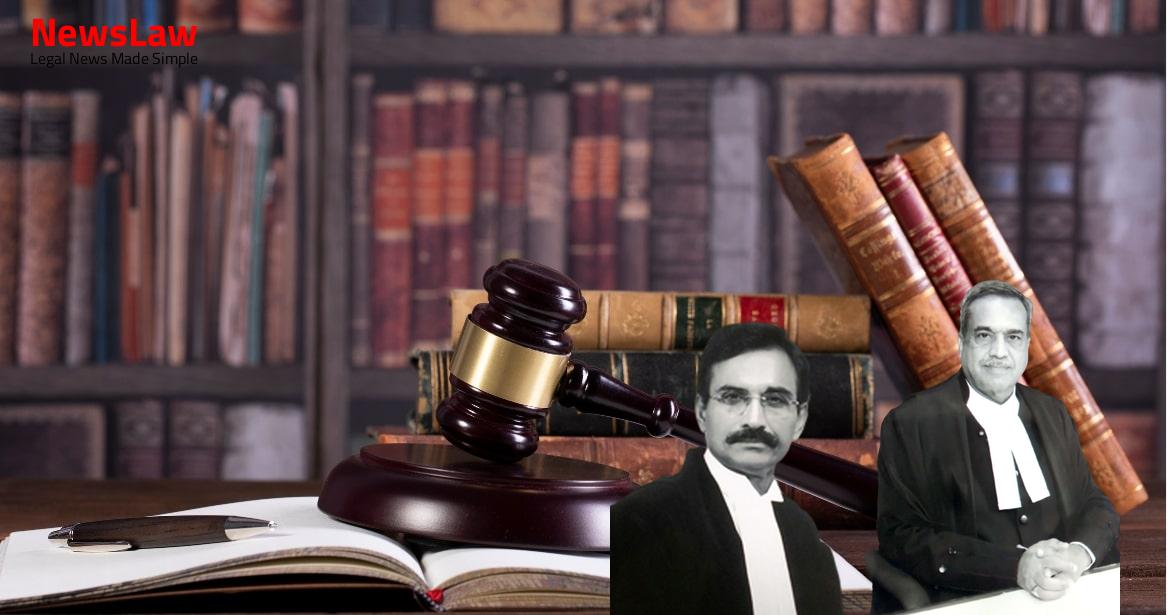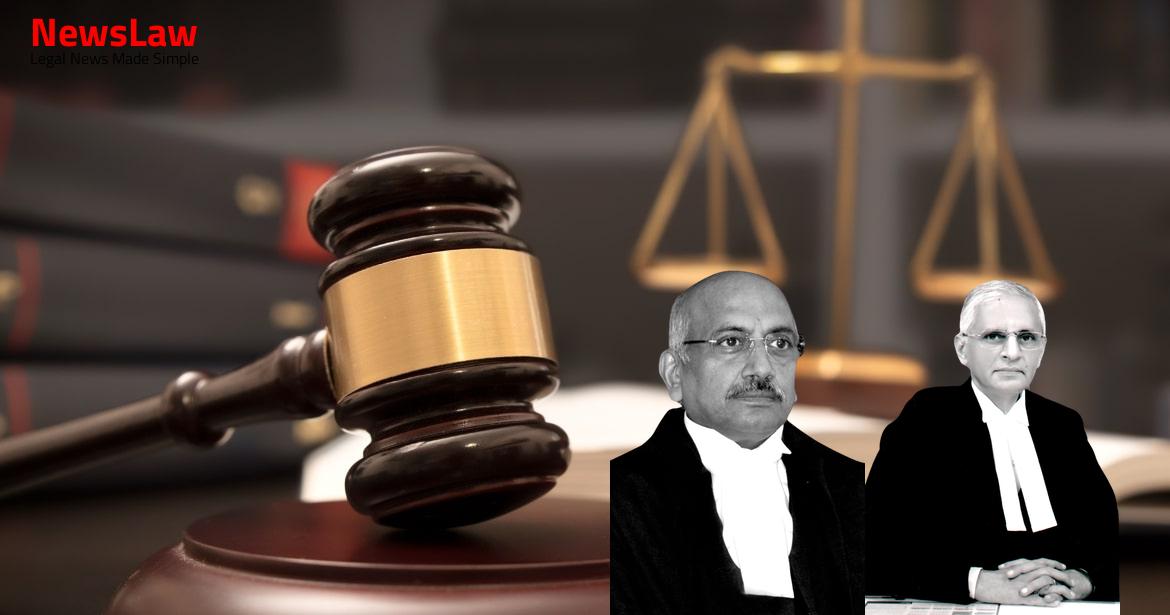In a significant legal development, the Supreme Court Of India has rendered a crucial decision in the case regarding the Equivalence of Posts. The appellate court revisited the contentious issue faced by the parties involved, examining the equating of posts between Principal, Grade ‘A’ (Senior Scale) and JCIF. This decision holds paramount importance as it overturns the High Court’s ruling, impacting the career progression and administrative decisions related to the parties. Stay informed about this landmark judgment.
Facts
- Sri P.S. Krishnamurthy challenged the promotion of Principal, ITI
- Challenges were dismissed by the Central Administrative Tribunal
- Government proposed to UPSC to amend recruitment rules equating Principal, ITI with JCIF
- Principal, ITI was transferred to Principal, Group ‘A’ (Senior Scale)
- Subsequent promotions of Sri P.S. Krishnamurthy were challenged
- O.A. No. 795 of 2001 was dismissed by the Tribunal
- O.A. No. 218 of 2005 challenged transfer and recruitment rules
- O.A. No. 814 of 2005 challenged the amended recruitment rules equating JCIF and Principal, Group ‘A’ (Senior Scale)
- Sri P.S. Krishnamurthy’s promotions and challenges to promotions were detailed
- The transfer of Original Applicant from JCIF to Principal, Group ‘A’ (Senior Scale) was quashed by the Tribunal and the High Court upheld this decision.
- The reliance on draft recruitment rules to support the transfer was deemed unsustainable as approval from UPSC and notification was necessary.
- The transfer was deemed mala fide and with ulterior motives by the Tribunal.
- Challenging the High Court’s decision, the appellants filed writ petitions which were dismissed, rendering the challenge to the transfer order infructuous/academic.
- Concurrent findings by the Tribunal and High Court held the transfer as mala fide.
- The High Court also dismissed writ petitions challenging the setting aside of the amended rules equating the posts of Principal and JCIF.
- The amended rules were deemed arbitrary and violative of Articles 14 and 16 by the Tribunal.
Also Read: Supreme Court Ruling on Dowry Harassment and Suicide Case
Arguments
- The appellant’s counsel argues that the pattern of having the same rules for a group of posts, with common feeder cadres, was in existence even in lower cadres.
- The educational qualifications for the posts in question do not need to be identical in duties and responsibilities, but rather in capability to discharge the functions.
- The appellant’s counsel highlights the career progression of the original applicant from a craft instructor to various higher posts, showcasing competence and capability.
- Referring to legal precedents, the appellant’s counsel asserts that the rules equating the posts were statutory and legislative in nature, thus not subject to challenge.
- There is a query on how the period from the transfer date until the original applicant’s superannuation should be treated.
- The matter of posts’ equivalence pertains to policy decisions within the state’s jurisdiction, and the courts should not interfere with such decisions.
- The challenge before the tribunal was limited to equating the two posts and not the entire rules, according to the appellant’s counsel.
- The High Court and tribunal are accused of error in quashing the amended rules equating the posts, as the rules were approved by UPSC after due deliberation.
- Citing a Supreme Court decision, the appellant’s counsel emphasizes that the government has the authority to equate posts as deemed appropriate.
- The roles of Junior Central Industrial Fund (JCIF) and Principal, Grade ‘A’ (Senior Scale) are argued to be identical in nature, backed by common feeder cadres and rules.
- The respondent, represented by Shri Pramod Swarup, supported the impugned judgment and order passed by the High Court.
- The respondent argued that the equating of the post of Principal, Grade ‘A’ (Senior Scale) with the post of JCIF was rightly set aside by the High Court and the Tribunal.
- The respondent cited the decisions of the Supreme Court in P. K. Roy and Roop Lal cases to support the stance that the nature of duties, responsibilities, and powers of the two posts are not similar.
- Based on the lack of similarity in duties and responsibilities, the respondent emphasized that the High Court’s confirmation of the Tribunal’s decision to quash the amended rules was justified.
- Therefore, the respondent prayed for the dismissal of the present appeals.
Also Read: Case of Technical Equipment Officer Appointment Criteria Dispute
Analysis
- The Government of Pondicherry proposed to frame common Recruitment Rules for the post of Joint Chief Inspector of Factories and Principal, Group ‘A’ (Senior Scale)
- After examination, the proposal was sent to the UPSC for certification on the matching duties of both posts
- UPSC concurred to the proposal after amendments were made and draft rules were approved
- Government of Pondicherry certified that there is no impediment to having common Recruitment Rules for both posts
- The Tribunal and High Court quashed the amended rules equating the post of Principal, Grade ‘A’ (Senior Scale) with that of JCIF, citing differing duties, responsibilities, and powers
- Critical factors considered included the need for officer rotation, promotional avenues, and compliance with Central Vigilance Commission guidelines
- UPSC’s concurrence was given after due deliberation with the Government, showing a policy decision to equate the two posts
- High Court’s dismissal of the writ petition and confirmation of the Tribunal’s decision was deemed erroneous for not considering the relevant factors and the policy decision made
- Statutory tribunals cannot direct the government on recruitment methods or eligibility criteria.
- The State can change service rules, qualifications, eligibility criteria, and promotion avenues as needed.
- Employees cannot claim that service rules remain the same forever; changes can be made based on administrative needs.
- Factors to determine the equivalence of posts include nature of duties, responsibilities, qualifications required, and salary.
- The High Court dismissed writ petitions challenging the equating of two posts, following precedents related to post equivalences.
- The decisions in the cases of P.K. Roy and Roop Lal were not considered applicable to the current case.
- The decision in the case of P.K. Roy pertained to administrative equivalence in the context of state reorganization.
- The decision in the mentioned case is not applicable to the current case due to different facts.
- The High Court’s decision and the Tribunal’s decision to quash the amended rules equating the two posts were not agreed upon.
- The duties of both the JCIF and Principal, Grade ‘A’ (Senior Scale) posts are considered to be identical or similar in nature.
- Therefore, the judgments by the High Court and the Tribunal should be quashed and set aside.
Also Read: Supreme Court Judgement on Transfer of Mining Environmental Clearances
Decision
- The appeal arising from Writ Petition No. 44922 of 2006 is allowed, quashing and setting aside the impugned judgment.
- The order of transfer set aside by the Tribunal in O.A. No. 218 of 2005 is disposed of, with liberty reserved for challenging the ‘dies-non’ period between 15.03.2005 till superannuation before an appropriate forum.
- No costs are awarded.
- The recruitment rules equating the post of Principal, Grade ‘A’ with JCIF are upheld, as the High Court quashing the rules is set aside.
Case Title: UNION OF INDIA AND ORS. ETC. ETC. Vs. S. MAADASAMY AND ANR. ETC. ETC.
Case Number: C.A. No.-005969-005970 / 2009



